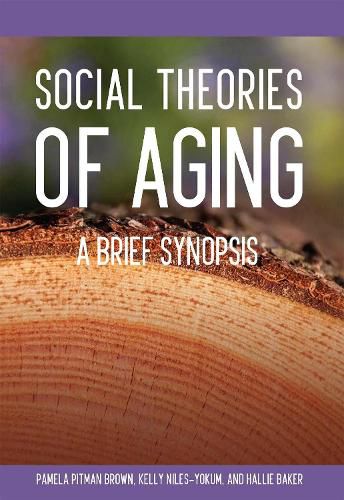Readings Newsletter
Become a Readings Member to make your shopping experience even easier.
Sign in or sign up for free!
You’re not far away from qualifying for FREE standard shipping within Australia
You’ve qualified for FREE standard shipping within Australia
The cart is loading…






Social Theories of Aging: A Brief Synopsis introduces students to a broad spectrum of social theories on aging. Each theory is categorized as first, second, or third generation according to three theoretical levels: micro-level (individual aging theories), macro-level (societal aging theories), and micro-macro-level (emerging theories). The book provides students not only with a synopsis of key theories but with the agency to create their own knowledge and search for answers within the gerontology discipline.
Over the course of six chapters, students explore a variety of generational theories. Each overview presents a theory’s level, intellectual origins, and basic tenets. The theories span many fields and subfields of gerontology including social gerontology, sociology, anthropology, public administration, psychology, social work, and geriatrics. Activity Theory, Disengagement Theory, Modernization Theory, Continuity Theory, Exchange Theory, Age Stratification, Social Constructionist, and Transformative Learning Theory are just a few of the theories addressed in the text.
Highly accessible and concise in nature, Social Theories of Aging is an ideal textbook for introductory gerontology courses. It can also be used in graduate level courses to remind students of the theoretical underpinnings of gerontology.
$9.00 standard shipping within Australia
FREE standard shipping within Australia for orders over $100.00
Express & International shipping calculated at checkout
Social Theories of Aging: A Brief Synopsis introduces students to a broad spectrum of social theories on aging. Each theory is categorized as first, second, or third generation according to three theoretical levels: micro-level (individual aging theories), macro-level (societal aging theories), and micro-macro-level (emerging theories). The book provides students not only with a synopsis of key theories but with the agency to create their own knowledge and search for answers within the gerontology discipline.
Over the course of six chapters, students explore a variety of generational theories. Each overview presents a theory’s level, intellectual origins, and basic tenets. The theories span many fields and subfields of gerontology including social gerontology, sociology, anthropology, public administration, psychology, social work, and geriatrics. Activity Theory, Disengagement Theory, Modernization Theory, Continuity Theory, Exchange Theory, Age Stratification, Social Constructionist, and Transformative Learning Theory are just a few of the theories addressed in the text.
Highly accessible and concise in nature, Social Theories of Aging is an ideal textbook for introductory gerontology courses. It can also be used in graduate level courses to remind students of the theoretical underpinnings of gerontology.